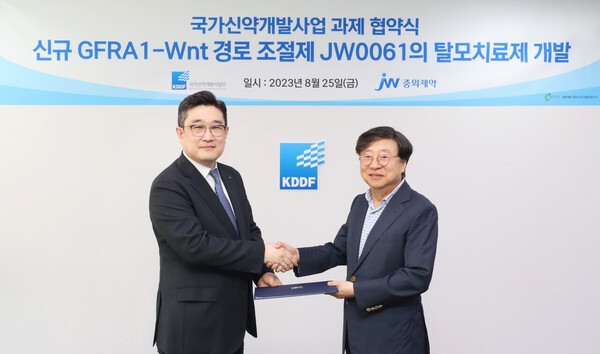
JW Pharmaceutical said Monday that JW0061, a Wnt-targeted hair loss treatment, has been selected as a project for the “first national new drug development project in 2023.”
The company also signed a research and development (R&D) agreement with the Korea Drug Development Fund (KDDF).
Under the agreement, JW Pharmaceutical will receive nonclinical research funding for JW0061 for the next two years from the KDDF. The National New Drug Development Program is an interdepartmental R&D program that supports the entire drug development cycle to strengthen the global competitiveness of the domestic pharmaceutical and biotechnology industry and improve public health.
JW0061 is a first-in-class drug candidate that promotes hair follicle proliferation and hair regeneration by activating the Wnt signaling pathway in skin and hair follicle stem cells. The Wnt signaling pathway plays an important role in skin development and hair follicle formation during embryogenesis. It is required for skin stem cells to transform into hair follicle stem cells and differentiate into hair follicles. It is involved in the proliferation of dermal papilla cells located at the tip of the hair root and regulates hair growth and maintenance.
JW Pharmaceutical unveiled the preclinical results of JW0061 at the Wnt 2022 conference in Japan last November. According to its presentation, JW0061 directly binds to the GFRA1 protein in breast papilla cells and activates the Wnt signaling pathway. It drew attention as the first report of a small molecule drug with an identified mechanism of action for hair growth.
In addition, the company unveiled the results of animal experiments that confirmed the superior hair growth and follicular neogenesis effects of JW0061 compared to placebo. Hair growth cycles through three phases: anagen, catagen, and telogen, and JW0061 accelerated the entry of the anagen phase by more than 30 percent (15 days), which takes an average of more than 50 days.
To initiate clinical trials of JW0061 in 2024, JW Pharm is conducting toxicity evaluations at global institutions, according to GLP (Good Laboratory Practice). In addition, the company is conducting research on the production of the drug for clinical use and optimization of the transdermal formulation.
"JW0061 specifically activates GFRA1, a new target independent of male hormones, and is expected to be used for both male and female hair loss patients with excellent safety," a company official said. "With the selection of this national project, we will quickly complete nonclinical trials of JW0061 and develop it into a global innovative new drug that complements and replaces existing hair loss treatments."
Since the launch of the National New Drug Development Project in 2021, JW Pharm has received the government’s support for three of its research projects -- the nonclinical study of JW0061, the nonclinical study of STAT3-targeted anticancer drug JW2286, and the optimization study of STAT3-targeted atopic dermatitis drug candidates.
In 2017, JW1601 (a histamine H4 receptor antagonist), a new drug candidate for atopic dermatitis that was exported to Leo Pharma of Denmark in 2018, was selected as a nonclinical support project for the Inter-Ministry Drug Development Project, the predecessor of the National Drug Development Project.
Related articles
- JW Pharmaceutical advances phase 3 study of gout drug in Taiwan, marking 1st foreign IND milestone
- Boosted by original drugs, JW Pharm posts record-high Q2 earnings, robust stock prices
- JW Pharmaceutical ‘reapplies’ for global p3 trial of gout drug in Taiwan
- JW Group relocates to Gwacheon, bolstering R&D
- JW Pharmaceutical explores novel drug candidates with Zefit's zebrafish models
- LEO Pharma returns rights for atopic dermatitis drug candidate to JW Pharmaceutical due to lack of efficacy
- JW Pharmaceutical, Theraject Asia to advance microneedle hair loss treatment
- JW Pharmaceutical's gout drug candidate gets nod for phase 3 study in Malaysia
- JW Pharm releases smaller and easier-to-take painkiller

